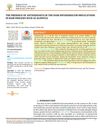 11 citations,
August 2013 in “Facial Plastic Surgery Clinics of North America”
11 citations,
August 2013 in “Facial Plastic Surgery Clinics of North America” New cell-based therapies may improve hair loss treatments in the future.
 6 citations,
October 1997 in “CNS Drugs”
6 citations,
October 1997 in “CNS Drugs” Psychotropic drugs can cause hair loss or excessive hair growth.
 1 citations,
April 2021 in “The journal of investigative dermatology/Journal of investigative dermatology”
1 citations,
April 2021 in “The journal of investigative dermatology/Journal of investigative dermatology” mTORC1 activity is important for hair growth and color, and targeting it could help treat hair loss and greying.
 77 citations,
July 2012 in “Journal of Investigative Dermatology”
77 citations,
July 2012 in “Journal of Investigative Dermatology” Wnt10b overexpression can regenerate hair follicles, possibly helping treat hair loss and alopecia.
 38 citations,
June 2017 in “The Journal of Dermatology”
38 citations,
June 2017 in “The Journal of Dermatology” Aging in hair follicle stem cells leads to hair graying, thinning, and loss.
 26 citations,
January 2013 in “BioMed Research International”
26 citations,
January 2013 in “BioMed Research International” Hormonal changes after childbirth and menopause can lead to women's hair loss and facial hair growth, with a need for better treatments.
 9 citations,
January 2005 in “Experimental dermatology”
9 citations,
January 2005 in “Experimental dermatology” Melatonin receptors in hair follicles help regulate hair growth and could treat hair loss.
 7 citations,
December 2017 in “Anais da Academia Brasileira de Ciências”
7 citations,
December 2017 in “Anais da Academia Brasileira de Ciências” 6-Gingerol from ginger may slow down hair growth by affecting certain enzymes and growth factors.
 1 citations,
September 2023 in “eLife”
1 citations,
September 2023 in “eLife” TLR2 is important for hair growth and can be targeted to treat hair loss.
 1 citations,
October 2002 in “Dermatologic Surgery”
1 citations,
October 2002 in “Dermatologic Surgery” Minoxidil can increase hair density, speed up regrowth in transplanted hair, and slow down further hair loss, especially beneficial for women, young men with thinning hair, and those wanting to reconstruct the back of the scalp.
 June 2022 in “International Journal of Research -GRANTHAALAYAH”
June 2022 in “International Journal of Research -GRANTHAALAYAH” Antioxidants like catalase are important for preventing hair loss conditions like alopecia.
 April 2021 in “The journal of investigative dermatology/Journal of investigative dermatology”
April 2021 in “The journal of investigative dermatology/Journal of investigative dermatology” The anti-hair loss shampoo effectively promotes hair growth and improves hair quality.
 48 citations,
June 2013 in “Journal of Dermatological Science”
48 citations,
June 2013 in “Journal of Dermatological Science” Valproic acid may help hair grow and could be a safe treatment for hair loss.
 31 citations,
October 2002 in “Dermatologic Surgery”
31 citations,
October 2002 in “Dermatologic Surgery” Minoxidil helps stabilize hair loss, increase density, and reduce shedding after hair transplant surgery.
 27 citations,
February 2017 in “Clinical, Cosmetic and Investigational Dermatology”
27 citations,
February 2017 in “Clinical, Cosmetic and Investigational Dermatology” New compounds were found to help increase hair growth and decrease hair loss.
 26 citations,
May 2019 in “PLOS ONE”
26 citations,
May 2019 in “PLOS ONE” Hair loss patients have different microbes in hair follicles, possibly affecting hair loss.
 15 citations,
August 2017 in “International Journal of Molecular Medicine”
15 citations,
August 2017 in “International Journal of Molecular Medicine” Panax ginseng extract may help prevent hair loss caused by DKK-1.
 12 citations,
July 2014 in “Journal of Investigative Dermatology”
12 citations,
July 2014 in “Journal of Investigative Dermatology” Chemotherapy causes complex changes in hair follicle cells that can lead to hair loss.
 10 citations,
June 2016 in “Wound Repair and Regeneration”
10 citations,
June 2016 in “Wound Repair and Regeneration” The microenvironment, especially mechanical forces, plays a crucial role in hair growth and could lead to new treatments for hair loss.
 6 citations,
January 2010 in “Actas Dermo-Sifiliográficas”
6 citations,
January 2010 in “Actas Dermo-Sifiliográficas” Follicular Unit Hair Transplantation has become a less invasive procedure with natural results, suitable for certain adults with hair loss.
 3 citations,
November 2019 in “Journal of Investigative Dermatology”
3 citations,
November 2019 in “Journal of Investigative Dermatology” Adenosine helps human hair grow and prevents hair loss by targeting specific cells.
 1 citations,
January 2024 in “Journal of applied pharmaceutical science”
1 citations,
January 2024 in “Journal of applied pharmaceutical science” Bacteria from Xylocarpus fruit can be used in hair creams to treat hair loss and fight infections.
 April 2024 in “Frontiers in physiology”
April 2024 in “Frontiers in physiology” Immune cells are crucial for hair growth and preventing hair loss.
 April 2024 in “bioRxiv (Cold Spring Harbor Laboratory)”
April 2024 in “bioRxiv (Cold Spring Harbor Laboratory)” GRK2 is essential for healthy hair follicle function, and its absence can lead to hair loss and cysts.
 February 2024 in “Biomedical materials”
February 2024 in “Biomedical materials” Scientists created a lab-grown hair follicle model that behaves like real hair and could improve hair loss treatment research.
 January 2015 in “Journal of clinical & experimental dermatology research”
January 2015 in “Journal of clinical & experimental dermatology research” A protein combining parathyroid hormone and collagen helped hair regrow in mice with a hair loss condition.
 125 citations,
September 2001 in “The FASEB Journal”
125 citations,
September 2001 in “The FASEB Journal” Stress can cause hair loss by negatively affecting hair follicles and this effect might be reversed with specific treatments.
 101 citations,
January 1997 in “Journal of Investigative Dermatology Symposium Proceedings”
101 citations,
January 1997 in “Journal of Investigative Dermatology Symposium Proceedings” Nerves and chemicals in the body can affect hair growth and loss.
 24 citations,
November 2013 in “Trends in pharmacological sciences”
24 citations,
November 2013 in “Trends in pharmacological sciences” Increasing ABC transporters in hair follicles may prevent chemotherapy-induced hair loss.
 11 citations,
September 2014 in “International Journal of Molecular Sciences”
11 citations,
September 2014 in “International Journal of Molecular Sciences” Mycophenolate helps reverse hair loss effects caused by IFN-γ by activating a key hair growth pathway.






























